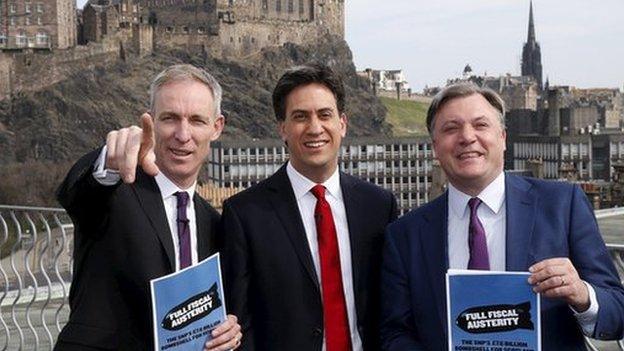Election 2015: SNP will represent UK interests, leader Nicola Sturgeon says
- Published
- comments
Nicola Sturgeon launches the SNP's general election manifesto saying it is "bursting with ideas and ambition" for all of the UK
SNP leader Nicola Sturgeon has promised to represent the interests of voters across the UK, if her party wins influence at Westminster.
Ms Sturgeon launched the nationalists' election manifesto, external, pledging to fight for public spending increases and end cuts across Britain.
And she said SNP MPs would make "Scotland stronger at Westminster".
Ms Sturgeon's political opponents said her manifesto commitments would plunge the UK further into debt.
Key priorities
SNP
Main pledges
- Spending increase of 0.5% a year, enabling £140bn extra investment
- Annual UK target of 100,000 affordable homes
- Increase in minimum wage to £8.70 by 2020
- Restore the 50p top income tax rate for those earning more than £150,000; introduce a mansion tax and a bankers' bonus tax
- Build an alliance against the renewal of Trident
- Retain the triple lock on pensions and protect the winter fuel allowance
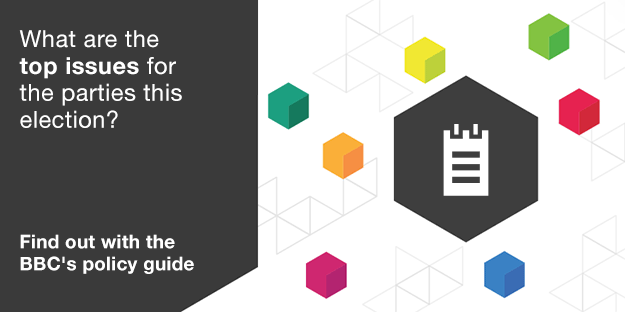
Polling has suggested no party will win an overall majority on 7 May, and the SNP could be the UK's third largest party.
Labour has rejected the idea of a coalition with the SNP, although its leader Ed Miliband, has refused to be drawn on whether another arrangement, such as a vote-by-vote deal, could be done.
Ms Sturgeon said she would not do any deal which would put the Conservatives into power, but argued her party could use its influence to make a Labour government "bolder and better".
She said: "This is a manifesto to make Scotland stronger at Westminster.
"The pledge I make to the Scottish people is this. If you vote SNP on 7 May, we will make your voice heard more loudly and clearly than it has ever been heard before at Westminster."
In other election news:
David Cameron promises an annual review of the impact of further Scottish devolution on the rest of the UK
Anyone wishing to vote on 7 May must register by midnight on Monday
Labour is focusing on health, claiming there is wide support for NHS charging and privatisation among Tory councillors
Sinn Fein has launched its election manifesto, saying it wants an extra £1.5bn for Northern Ireland in negotiations with an incoming government.
In a direct address to people in England, Wales and Northern Ireland, the Scottish first minister added: "Although you can't vote SNP your views do matter to me and you have a right to know what to expect of my party if the votes of the Scottish people give us influence in a hung parliament.
"If the SNP emerges from this election in a position of influence we will exercise that influence responsibly and constructively, and we will always seek to exercise it in the interests of people not just in Scotland but across the whole of the UK."
The SNP manifesto included pledges to:
Increase spending by 0.5% a year, providing an extra £140bn to support the economy and public services, including an extra £24bn for the NHS across the UK
Set an annual UK target to build 100,000 affordable homes
Increase the minimum wage to £8.70 by 2020
Restore the 50p top income tax rate for those earning over £150,000
Support an increase in the Employment Allowance from £2,000 per business per year to £6,000, to help smaller firms take on more staff
Oppose the "£3bn cut" in disability support
Keep the triple lock on pensions and protect the winter fuel allowance.


ANALYSIS
By Brian Taylor, BBC Scotland political editor
It would have been easy, so easy, for the SNP manifesto launch to slide towards bombast. The elements were all there.
The polls suggest a substantial lead for the Nationalists. The venue was, literally, cavernous and crowded with eager supporters - who were ready to cheer volubly at any mention of independence, Scotland or indeed Nicola Sturgeon.
Sheffield, anyone? Not a chance. After eight years in devolved government, Ms Sturgeon is nothing if not cautious. Her mood was cool, serious and controlled, with elements of self-effacing humour.
By Nick Robinson, BBC Political Editor
Something truly extraordinary happened this morning.
A woman who is not even a candidate in this election; whose party is running in just one of the four nations and which, even if it does as spectacularly well as some polls suggest, would have just one in 13 MPs in Westminster pledged to build not just a "stronger Scotland" but a "better and more progressive politics for everyone" in the UK.
Nicola Sturgeon showed once again why she is the undoubted star of this general election campaign and why she says her Inbox is filled with emails from voters from outside Scotland who want the chance to vote SNP.
By Robert Peston, BBC Economics Editor
Labour last week put at the heart of its manifesto that, if elected, it would get the government's deficit and debt down in the course of the next parliament, and to that end there would be cuts in non-protected public services (or everything but schools, health and overseas aid).
It did that partly because all its polling showed that in England it would need to demonstrate what it thinks of as "fiscal credibility" to get a hearing from undecided voters.
So it is quite definitely not an act of amity and solidarity with its putative Labour brothers for the SNP, led by Nicola Sturgeon, to tell voters that she'll get the Tories out, get Labour in and make sure Labour won't stick to its fiscal promises.
By James Cook, BBC Scotland Correspondent
The Scottish National Party "will always support independence" says its leader Nicola Sturgeon - but after the proposition was rejected in last year's referendum, she has set her sights on a staging post.
The immediate constitutional goal is now for Scotland to gain control of all taxation, including North Sea revenues, loosening the ties that bind the United Kingdom together.
The SNP manifesto launched today ditches the dismal name for this policy of "full fiscal autonomy" in favour of "full fiscal responsibility" and "full financial responsibility."
Better? You can decide.

Scottish Liberal Democrat Alistair Carmichael said the SNP manifesto had confirmed a £180bn borrowing plan which would cost £3.1bn a year in interest repayments alone.
And the Scottish secretary said Ms Sturgeon's backing for full fiscal autonomy - which would see Scotland gain control of all its own tax powers - would create a £40bn black hole Scotland's finances.
"This is a manifesto of short-term thinking leading to long-term debt," he explained.
"Instead of taking the opportunity to map a route out of debt, Nicola Sturgeon is sticking with a plan to plunge the country further into it.
Conservative leader David Cameron said of the SNP manifesto: "You would see our deficit climbing up again, you'd see spending on Welfare soaring again, businesses crushed again, jobs lost again.
"With Labour and the SNP, our economy will head into ruin again. And who will pay? You will pay with higher taxes."
Reaction to the launch of the SNP's 2015 election manifesto
Scottish Labour leader Jim Murphy said the SNP had previously described last year's independence referendum as a "once-in-a-generation event" and had broken a promise to the people by refusing to rule out another one.
Mr Murphy added: "When you look at all the pressures in Scotland - the growing gap between the poor and the prosperous, the crisis in the NHS and the number of people stuck on zero hours contracts, then Scotland surely has higher priorities than thinking about another referendum.
"This is a 'say one thing do another' manifesto. They claim to support a UK-wide mansion tax at the same time as committing to cutting Scotland off from UK-wide taxes."
Meanwhile, UKIP leader Nigel Farage said Mr Cameron, Mr Miliband and Lib Dem leader Nick Clegg had shown "appalling weakness" and accused them of engaging in "outright appeasement" in the face of aggressive SNP tactics.
He said: "All three of them have guaranteed the continuation of the Barnett Formula in its present guise, ripping-off English voters and throwing truckloads of English money over Hadrian's Wall.
"And none of them will guarantee that only English MPs will vote on English laws in the next parliament, meaning that any new influx of SNP MPs will be able to dictate the governance of England.
- Published20 April 2015
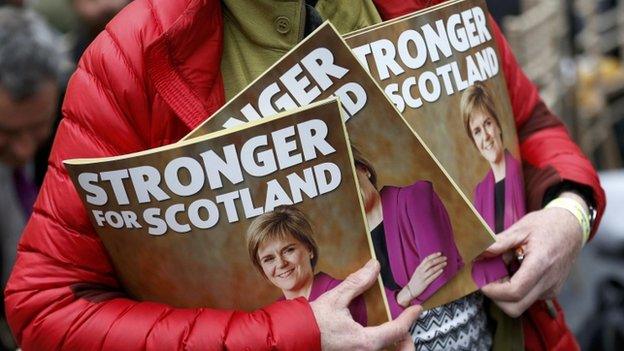
- Published20 April 2015
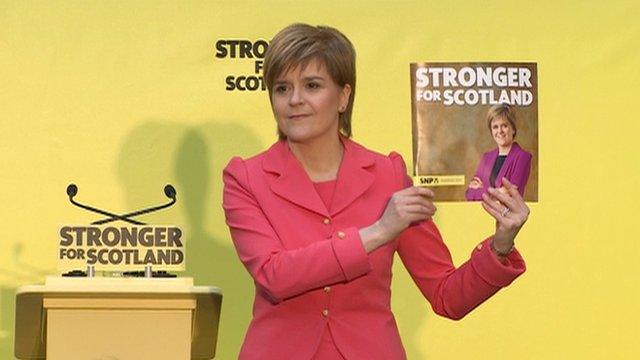
- Published20 April 2015
- Published20 April 2015
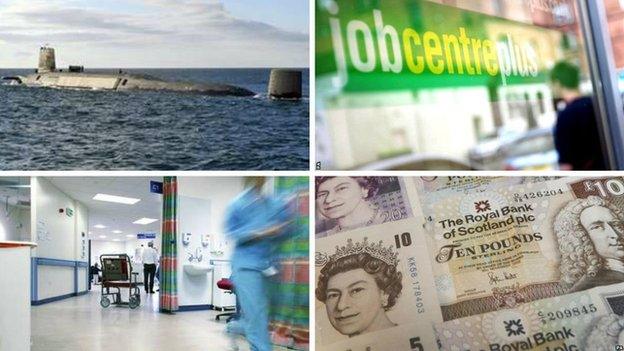
- Published20 April 2015
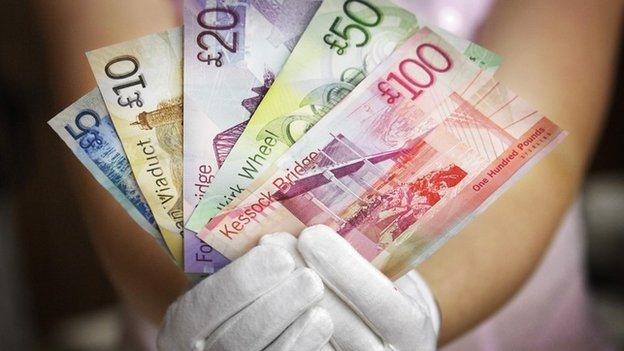
- Published20 April 2015
